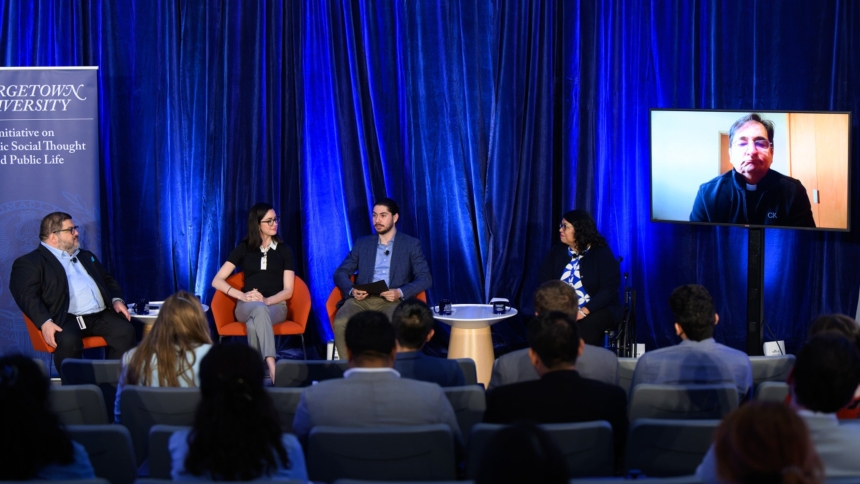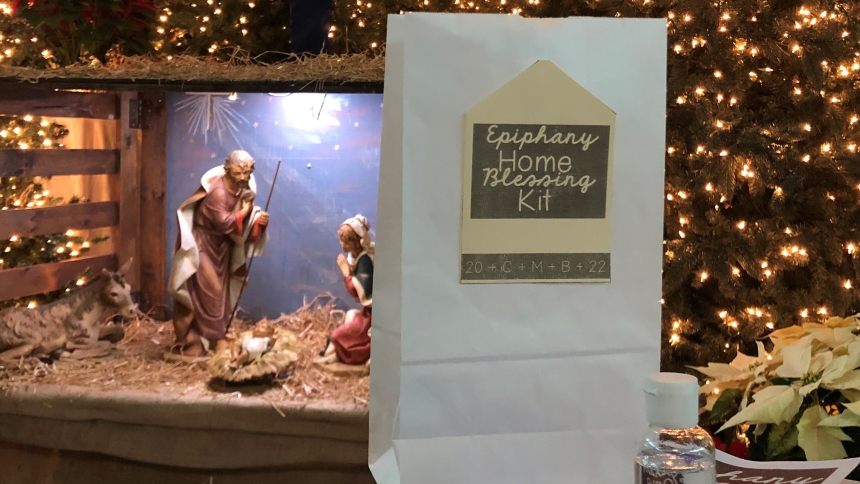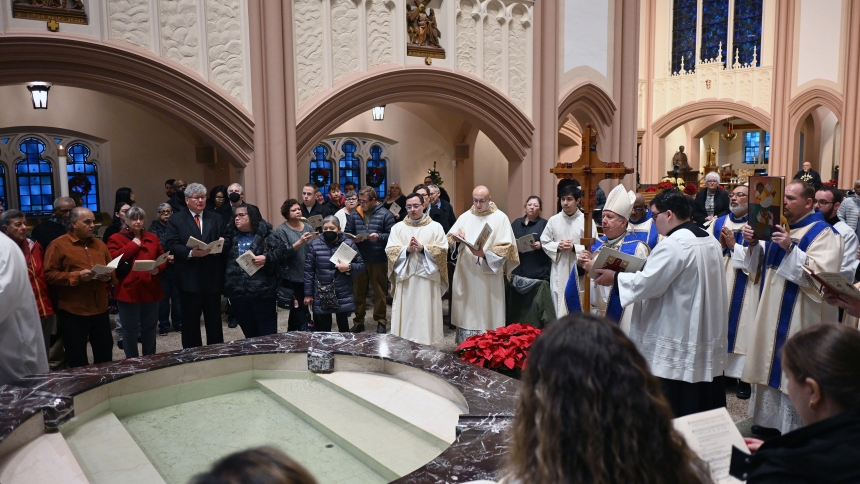
WASHINGTON (OSV News) - Environmental change is a great challenge, a priority, and, often, a matter of life and death for some vulnerable Hispanic communities - which is why caring for the planet is vital, said experts May 22 at an event sponsored by the Georgetown University's Initiative on Catholic Social Thought and Public Life.
During the dialogue "Climate Change, Environmental Justice, and Latino Priorities: Hearing the Cry of the Earth and the Cry of the Poor," panelists said that the climate crisis must be addressed quickly and collectively because environmental degradation threatens entire communities, especially the poor and vulnerable.
Washington Auxiliary Bishop Evelio Menjívar-Ayala, echoing Pope Francis's words, said that we need to listen to both cries as they are connected. "This is why the Earth herself, burdened and laid waste, is among the most abandoned and maltreated of our poor," the bishop said, drawing from the encyclical "Laudato Si'".
The bishop - who during a May 18 speech to graduates of Georgetown's College of Arts and Sciences stressed that how we treat the vulnerable in society is an indicator of whether we are a great nation - delved into the Catholic Church's position on the issue. "Our common home is like a sister with whom we share our lives and a beautiful mother who opens her arms to embrace us," he said.
Bishop Menjívar-Ayala added that the effects of humans thinking they have the right to plunder the Earth at will is reflected in the damage to the land, water, air, and all forms of life. Panelist also highlighted Pope Francis' urgent appeal to our conscience and calls for an inclusive dialogue on the future of our planet.
"Latino communities in the United States, who already experience a number of social inequities, are among those most affected and most concerned about the costs of climate change," said Christian Soenen, the Initiative's project manager, at the opening of the meeting on climate change, environmental justice, and Latino priorities.
According to surveys, Hispanics tend to be more concerned about environmental issues than other Americans, said Mark Hugo Lopez, director of race and ethnicity research at Pew Research Center. "Three-quarters of Latino adults say that their communities are impacted at least some by environmental issues," he said.
Lopez said 70% report air and water pollution, as well as trash and landfills in their communities. He added that two-thirds of Hispanics say climate change is caused by human activity - more than the general population. More than other groups, they see this issue as a challenge for communities, the nation, and the world. They are more concerned, he said, about environmental degradation in their communities.
"About 61% of Latinos say addressing climate change is something that should be done by the president and congress as a top priority," he said, but added that the economy and inflation rank higher as priority issues. Notably, surveys show hyper-awareness and engagement with what is happening in the local community distinguishes the Latino population from other groups.
"For a lot of our communities, it's literally a matter of life and death and while climate change is here, it has been here longer and felt more deeply by communities that are Latino in the U.S.," said Elena Gaona, a communications specialist who has held multiple roles in non-profit organizations - including Catholic Climate Covenant - and government agencies.
She emphasized that some states suffer extreme heat and its consequences while explaining that polluting oil refineries are located in minority neighborhoods - which do not protest. "These effects are just felt deeply longer and in every stage of our lives," she said.
Bishop Joseph J. Tyson said that in his Diocese of Yakima, in Washington state, a large part of his diocese is made up of undocumented people. "They are very vulnerable working in the fields taking in the smoke from forest fires, exposure to pesticides and then you know labor practices that are not always fair" and are dangerous, he said. The prelate is the episcopal liaison for the Catholic Covenant and chairman of the U.S. bishop' Subcommittee on Pastoral Care for Migrants, Refugees, and Travelers.
"Environmental problems disproportionately affect low-income communities," said Silvia Foster-Frau, a national investigative reporter for the Washington Post. "(They) also have disproportionately high rates of illnesses and conditions."
Foster-Frau, who was part of a team whose series of stories won a Pulitzer Prize in 2024, added that it is very difficult for those communities, lawyers and activists to prove that a particular environmental factor exacerbates these long-term conditions and illnesses. She pointed at the effect of "illegally high levels of arsenic" that the majority Latino city of Sunland Park, New Mexico, had in their drinking water for 16 years.
"It really is incumbent on the government to make sure that there are arsenic treatment plants that are up and running and working constantly to keep the drinking water safe," she said.
The panelists also highlighted ways ordinary people become environmental activists to protect their health and safety. One example is mothers in Maryland who, concerned that their children have asthma, advocated for electric buses. Now, their children are breathing better, and their health has improved.
These are mothers who become community leaders and meet with legislators, share their stories and change laws, said Gaona, echoing examples from other participants.
"When we become civically engaged like that, they're not just voting. They are speaking up, organizing, attending meetings, signing petitions, sometimes running for office," she said. "And so that's what it takes."
Caption: Participants in the May 22, 2024 Latino Leader Gathering on "Climate Change, Environmental Justice, and Latino Priorities: Hearing the Cry of the Earth and the Cry of the Poor". From left to right: Mark Hugo Lopez, Silvia Foster-Frau, Christian Soenen, Elena Gaona, and Bishop Joseph Tyson (via livestream). (Foto OSV News/ cortesía de Georgetown University, Rafael Suanes)


